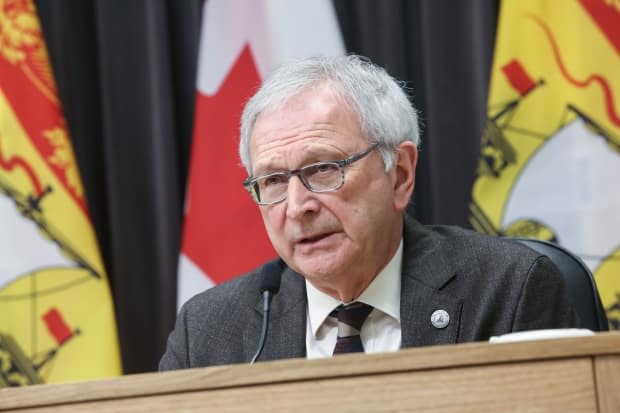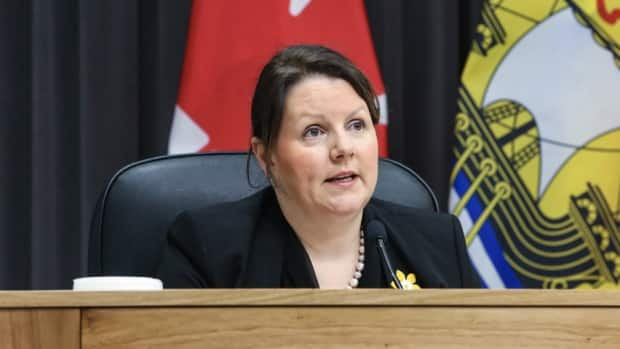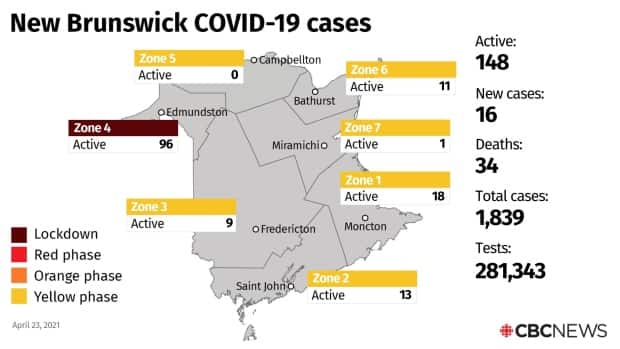N.B. COVID-19 roundup: Mandatory hotel isolation for leisure travellers, new rules for truckers, commuters

The New Brunswick government is bringing in additional travel restrictions for leisure travellers and people who travel for work such as truckers and commuters.
Premier Blaine Higgs announced Friday that starting Saturday at 11:59 p.m., people travelling for non-essential reasons will have to self-isolate at an isolation hotel at their own expense for at least the first seven days when they return to New Brunswick.
If they test negative on day five, they can continue their 14-day isolation at a home where no one else lives.
Higgs said the hotels will be in designated areas around the province, and the cost to stay in them would be around $200 a night.
The best approach would be to avoid travelling altogether if there's no need.
"If you don't need to come to New Brunswick, don't come here," he said. "We want you, just not right now."

When they arrive in New Brunswick, leisure travellers will have to drive themselves or use a taxi. Higgs said no family pickups or carpools are allowed.
Russell did not say how many of the 16 new cases announce Friday are related to leisure travel, but according to figures shared by the Department of Heath, 75 of the 175 recent travel-related cases are connected to non-essential travel.
Higgs asked people who are moving to New Brunswick to delay their move by a few months. He also asked leisure travellers wanting to return home to stay away for longer.
"If you are, for example, currently at a resort in Florida and are able to stay there for another month, please do so," he said. "The risk to you and to everyone you come into contact with is simply too high."
Higgs said the new rules will be mandatory until at least the end of May.
WATCH | New Brunswick Premier Blaine Higgs introduces new travel regulations
Chief medical officer of health Dr. Jennifer Russell said many of the of travel-related cases in New Brunswick have been caused by non-essential travel. She said people who leave province to visit family and friends and come back, have had to self-isolate away from others on their return.
"Judging by the new cases. … This is not happening as consistently as it should," she said.
Higgs said he's been saying for over year that people should avoid unnecessary travel.
"I know there's an imposition with individuals coming home," he said. "They can change their schedule, and if they can't, we have to be sure that we protect the rest of the population and they don't bring something more home than their suitcase."
This applies whether even if the traveller is vaccinated, Higgs said.
Commuters, truck drivers must self-isolate
Higgs also announced new travel restrictions for commuters and truck drivers, but not including rotational workers.
Starting Saturday at 11:59 p.m., once the workers return to New Brunswick, they will need to stay at home for 14 days except to meet medical needs and necessities of life, and as long as they use curbside pick up and delivery.
This applies whether or not they've been vaccinated. He said this will be re-evaluated weekly, but this new measure is also expected to remain in place until late May.
Truck drivers and all other travellers into New Brunswick must register before they're allowed to enter.
Also as of Saturday at 11:59 p.m., rotational workers will be required to self-isolate for 14 days, separate from others. If they must self-isolate with other people, those people will also have to self-isolate.
This also applies regardless of their vaccination status.

People who share a home with truck drivers or regular cross-border commuters don't have to self-isolate but are asked to minimize their contact with the workers.
Higgs also thanked truck drivers for making vaccination appointments.
He said fines issued to people who break these rules and others mandated by the emergency order will be increased from $292 to $580.
WATCH | Higgs on why N.B. won't offer leeway to leisure travellers who can't change plans right away
He said students coming into New Brunswick from anywhere in Atlantic Canada that's considered a "hot zone" such as Halifax, will also have to self isolate at hotels, but the province will cover that expense. People helping them move will also have to self isolate with them.
"This program will be overseen by the Canadian Red Cross," Higgs said.
Higgs also said high school would not be returning to full-time in person school for the rest of the school year.
Astra-Zeneca change makes little difference to N.B.
Shortly before the New Brunswick briefing, another briefing was being held by Canada's National Advisory Committee on Immunization, also known as NACI. The organization recommended expanding the use of the AstraZeneca-Oxford COVID-19 vaccine to all Canadians over the age of 30.
New Brunswick currently only uses Astra-Zeneca when vaccinating people 55 and older because there's a risk of it causing rare blood clots in younger people.
Russell said this new recommendation wouldn't have a big impact on the province's immunization efforts because it's almost out of Astra-Zeneca.
"New Brunswick is going to stay the course," she said. "We won't be getting any more Astra-Zenneca until probably the end of May."
16 new cases
Public health reported 16 new COVID-19 cases Friday, and there are now 150 active cases in the province.
Most of these cases are travel-related, and 11 of the travel-related cases are New Brunswick workers currently isolating outside the province, Russell said Friday.
Moncton region, Zone 1, four cases:
an individual 20 to 29
an individual 30 to 39
an individual 40 to 49
an individual 50 to 59
Three of these cases are travel related and one is under investigation.
Saint John region, Zone 2, two cases:
Both people 50 to 59.
Both cases are travel-related.
Edmundston region, Zone 4, two cases:
an individual 19 or under
an individual 40 to 49
Both cases are contacts of previously confirmed cases.
Bathurst region, Zone 6, eight cases:
four people 40 to 49
two people 50 to 59
two people 60 to 69
All eight cases are travel related.
Elsewhere in Atlantic Canada:
Nova Scotia reported 44 new cases on Friday, with the central Halifax region entering a four-week lockdown. Some cases were detected in a school and a long-term care home. There are now 150 active cases of COVID-19 in that province.
Newfoundland and Labrador had 1 new case Friday, with 23 active cases in total.
Prince Edward Island reported one new case of COVID-19 Thursday, connected to travel. There are 12 active cases in that province.

So far this week, New Brunswick has recorded 51 new cases of the respiratory illness, one death, the first detected case of blood clot caused by the AstraZeneca vaccine, and outbreaks at two special care homes, Pavillon Beau-Lieu in Grand Falls and Murray Street Lodge in Grand Bay-Westfield.
On Thursday, Higgs reminded people of the importance of self-isolating when entering the province. He also pointed out that there is a lower percentage of vaccinated long-term care home employees compared to other healthcare sectors.
Russell said the new variants detected in the province are spreading faster and they're more contagious.
As of Thursday, there have been 34 deaths.
148. Thirteen patients are hospitalized, including five in an intensive care unit. Yesterday, 1,333 tests were conducted for a total of 281,343. About 228,000 doses of the vaccine have been administered provincewide.
Potential exposure notifications
Moncton:
NEW: April 12 between 5:45 a.m. and 1:00 p.m. – emergency department – Dr. Georges-L.-Dumont University Hospital Centre (330 Université Ave., Moncton)
NEW: April 12 between 9:00 a.m. and 11:00 a.m. – x-ray department – Dr. Georges-L.-Dumont University Hospital Centre (330 Université Ave., Moncton)
April 14 between 10:30 a.m. and 2:30 p.m. – Urban Planet, Walmart and H&M – CF Champlain (477 Paul St., Dieppe)
April 8 between 4:45 p.m. and 5:30 p.m. – COSTCO Wholesale customer service (140 Granite Drive, Moncton)
April 8 between 2 p.m. and 4 p.m. – CF Champlain (477 Paul St., Dieppe)
Saint John
Holy Spirit Parish (Saint Matthews worship site), 45 Dollard Dr., Saint John, on Sunday, April 18 between 11 a.m. and noon. The church has closed for two weeks as a preventive measure, and St. Rose of Lima Church (part of Holy Spirit Parish) will also be closed for the next two weeks, until May 8-9.
Service New Brunswick, 15 King Square North, on April 15 between 3 p.m. and 3:45 p.m.
Rocky's Sports Bar, 7 Market Square, on April 15 between 4 p.m. and 6 p.m.\
Edmundston and region:
E.& P. Sénéchal Center, Vitalité Health Network vaccination clinic, 60 Ouellette St., Grand Falls, on Monday, April 19 between 1:15 p.m. and 7 p.m.
Familiprix, 131 de l'Église St., on April 8, between 10 a.m. and 1 p.m.
Jean Coutu, 77 Victoria St., Edmundston on April 16, between 1: 30 p.m. and 2 p.m.; on April 14, between noon and 12:45 p.m.; and on April 12, between 3 p.m. and 3:30 p.m.
Public Health also identified a traveller who may have been infected while on the following flights:
April 20 - Air Canada Flight 318 – from Calgary to Montreal, departed at 11:45 a.m.
April 20 - Air Canada Flight 8906 – from Montreal to Moncton, departed at 7:01 p.m.
April 15 - Air Canada Flight 8919 – from Toronto to Moncton, departed at 8:56 p.m.
April 14 - Air Canada Flight 8970 – from Ottawa to Montreal, departed at 6:28 a.m.
April 14 - Air Canada Flight 8898 – from Montreal to Moncton, departed at 8:14 a.m.
April 15 – Air Canada Flight 8906 – from Montreal to Moncton, departed at 7:08 p.m.
April 15 – Air Canada Flight 318 – from Calgary to Montreal departed at 11:53 a.m.
People who were at these areas are eligible to be tested for COVID-19, even if they are not experiencing symptoms.
What to do if you have a symptom
People concerned they might have COVID-19 symptoms can take a self-assessment test online.
Public Health says symptoms shown by people with COVID-19 have included:
Fever above 38 C.
New cough or worsening chronic cough.
Sore throat.
Runny nose.
Headache.
New onset of fatigue, muscle pain, diarrhea, loss of sense of taste or smell.
Difficulty breathing.
In children, symptoms have also included purple markings on the fingers and toes.
People with one of those symptoms should:
Stay at home.
Call Tele-Care 811 or their doctor.
Describe symptoms and travel history.
Follow instructions.

